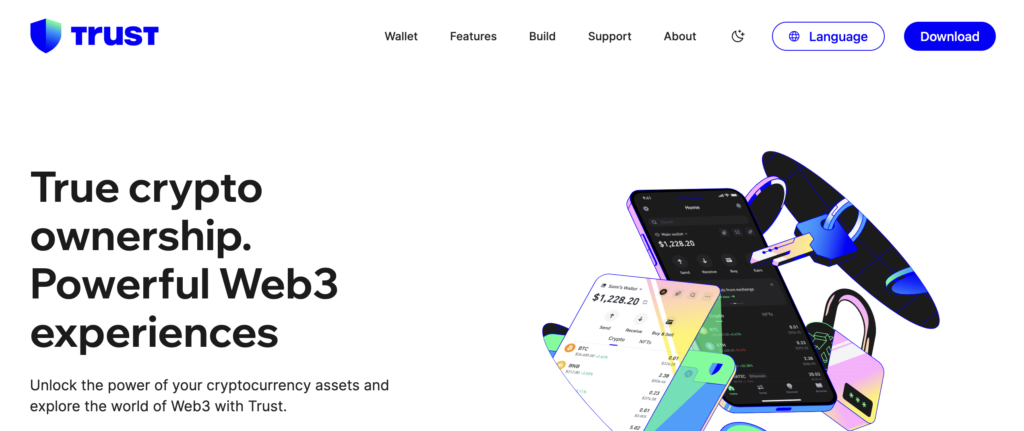Trust Wallet Token (TWT) represents a crucial component of the Trust Wallet ecosystem, which aims to provide a secure, user-friendly, and multi-functional cryptocurrency wallet. Trust Wallet itself is known for supporting a vast array of cryptocurrencies and enabling users to store, manage, and facilitate crypto transactions directly from their devices.

Project History of Trust Wallet
Trust Wallet was established in 2017 by Viktor Radchenko, originally focusing on providing a simple, secure, and user-friendly Ethereum wallet. Its development was driven by the burgeoning demand for mobile cryptocurrency solutions that provided both security and accessibility to a broad range of users.
Key Milestones
- 2017: Launch of Trust Wallet as a dedicated Ethereum wallet that supported Ethereum and ERC20 tokens.
- 2018: Acquisition by Binance, one of the world’s largest cryptocurrency exchanges. This pivotal event significantly expanded the wallet’s visibility and resource base.
- 2019: Expansion of supported assets to include not just Ethereum and its tokens but also other leading cryptocurrencies and blockchain networks.
- 2020 and Beyond: Introduction of additional features such as a native DApp browser, support for DeFi platforms, and integration of staking capabilities directly in the wallet.
Connection with Binance
The acquisition of Trust Wallet by Binance in July 2018 marked a significant turning point for the wallet. Binance’s CEO, Changpeng Zhao, emphasized that the acquisition would provide Binance users with an on-chain mobile wallet with robust security and an innovative user experience. Here are some key aspects of Trust Wallet’s relationship with Binance:
- Resource and Infrastructure Support: Post-acquisition, Trust Wallet benefitted from Binance’s robust technical infrastructure and broad user base, which facilitated rapid growth and the introduction of new features.
- Strategic Alignment: Trust Wallet operates as a cornerstone of Binance’s ecosystem, aligning with its mission to promote cryptocurrency adoption and simplify the processes of purchasing, trading, and managing crypto assets.
- Enhanced Features: Integration with Binance’s services, such as its decentralized exchange (Binance DEX), which is directly accessible through Trust Wallet, enhancing the functionality available to users.
This relationship has allowed Trust Wallet to maintain its identity as an innovative and user-focused product while benefiting from the scale and reach of a major global exchange. This synergy continues to play a crucial role in Trust Wallet’s ongoing development and popularity among cryptocurrency users worldwide.
What is Trust Wallet Token
Trust Wallet Token (TWT) is a utility token that facilitates various governance actions and user benefits within the Trust Wallet ecosystem. It allows token holders to participate in decision-making processes, benefit from reduced service fees, and engage in staking programs. The token is designed to solve the issue of creating a more decentralized and user-driven environment where the community can contribute to the wallet’s development.
How Trust Wallet Token Works
Trust Wallet Token operates on a foundation of robust technologies that differentiate it from other cryptocurrency wallet solutions, particularly focusing on versatility, user control, and integration.
Blockchain Integration and Unique Technologies
While Trust Wallet does not have its own native blockchain, it operates as a multi-chain wallet. This means it supports a multitude of blockchains, each with its own consensus mechanisms and protocols. This extensive support includes major players like Ethereum and BNB Smart Chain, as well as smaller, emerging blockchains.
Role of Supported Technologies:
- Ethereum: Trust Wallet utilizes Ethereum’s blockchain for ERC-20 tokens and engages with its decentralized applications (dApps). Ethereum’s Proof of Work (PoW) consensus mechanism, transitioning to Proof of Stake (PoS), offers robust security and decentralization, critical for Trust Wallet’s operations involving Ethereum-based assets and services.
- BNB Smart Chain (BSC): For TWT and other BEP-20 tokens, Trust Wallet leverages BSC’s dual-chain architecture. BSC operates under a Delegated Proof of Stake (DPoS) consensus model, which enhances transaction speed and reduces costs, benefiting Trust Wallet users by providing faster transactions and lower fees compared to those on the Ethereum network.
Distinctive Aspects of Trust Wallet’s Technology
Trust Wallet sets itself apart through its integration of non-custodial and client-side security mechanisms, which ensure that users have full control over their private keys and thereby, their funds. The wallet uses established security protocols to encrypt these keys directly on the user’s device, rather than storing them centrally. This decentralization of personal data minimizes risks of hacking and unauthorized access.
Smart Contracts and Their Utilization
Smart contracts in Trust Wallet are employed primarily for the staking mechanisms and the governance model. These contracts automatically execute, control, or document legally relevant events according to the terms of a contract or an agreement directly written into lines of code. For instance, in the governance model, smart contract-based voting systems allow TWT holders to propose, vote on, and implement changes within the ecosystem. This usage promotes a transparent and immutable governance process where all actions are recorded and verifiable on the blockchain.
Consensus Mechanism Specifics
As a wallet, Trust Wallet itself does not use a unique consensus mechanism but interacts with the consensus mechanisms of the blockchains it supports:
- Proof of Stake (PoS): In networks utilizing PoS, Trust Wallet facilitates interactions like staking where users can participate in network validation processes by locking their tokens to earn rewards.
- Delegated Proof of Stake (DPoS): In DPoS systems like Binance Smart Chain, Trust Wallet users can delegate their tokens to validator nodes, which are responsible for maintaining the network’s integrity and processing transactions.
Technical Details and Explanation
Each blockchain’s interaction within Trust Wallet is handled through its native interfaces, which are designed to seamlessly connect with corresponding networks without requiring manual configuration by the user. This ease of use is coupled with an assurance of security, as the integration respects the fundamental principles of each blockchain’s design, including their respective consensus rules and transaction validation processes.
In summary, Trust Wallet’s technology stack is distinguished by its multi-chain support, non-custodial security measures, and smart contract functionalities, making it a comprehensive tool for managing digital assets across various blockchains. This integration with multiple technologies and the ability to participate directly in network activities such as staking and governance through a single interface set Trust Wallet apart in the crowded field of crypto wallets.
Tokenomics of Trust Wallet Token
Trust Wallet Token (TWT) is a utility token, not a coin, as it operates on the BNB Smart Chain (BSC) under the BEP-20 token standard. This classification is crucial for understanding its role and functionality within the ecosystem—it acts as a utility token designed to enhance user engagement and platform governance, rather than serving as a standalone currency.
Emission Model and Distribution
The emission model of TWT is capped, meaning there is a finite supply of tokens, which is set at 1 billion TWT. This cap helps to introduce scarcity, potentially increasing the token’s value as demand grows. Initially, tokens were distributed primarily through airdrops to early adopters and through strategic partnerships and community incentives.
Detailed Tokenomics
- Utility: TWT is used within the Trust Wallet ecosystem to facilitate discounts on in-app cryptocurrency purchases and swaps, enhance user participation in governance through voting, and offer rewards in staking programs.
- Governance: Holders of TWT have the right to vote on proposals that influence the development and feature integration within the Trust Wallet app, aligning the wallet’s functionality with the community’s needs.
- Staking Rewards: By staking TWT, users can earn rewards, which not only helps secure the network but also incentivizes longer-term holding of the token, reducing market circulation.
- Burn Mechanism: Periodic token burns are implemented to reduce the overall supply of TWT, creating a deflationary effect. These burns are typically conducted based on the transaction volumes within the ecosystem, aligning the token’s value with the platform’s usage.
Market Dynamics and Price Factors
The price of TWT is influenced by several factors including the overall crypto market trends, specific demand for Trust Wallet’s services, and changes in the token’s utility within the ecosystem. As a utility token, its value is closely tied to how essential the token is for accessing services and features within the Trust Wallet platform. As the platform grows and integrates more services, demand for TWT may increase, potentially affecting its price positively.
By being integrated into the operational framework of Trust Wallet and offering both practical utility and financial incentives, TWT’s tokenomics are designed to sustain a vibrant and active ecosystem. The combination of a fixed supply cap, utility in governance, and rewards for participation ensures that TWT holders are directly invested in the platform’s success and longevity.
Where to Buy TWT
Trust Wallet Token (TWT) is available for purchase on several leading cryptocurrency exchanges, providing users with various platforms to acquire the token based on their preference for liquidity, fee structure, or geographical location. Here are some notable exchanges where TWT can be bought:
- Binance: As one of the largest and most popular cryptocurrency exchanges globally, Binance offers robust liquidity for TWT, allowing users to trade it against multiple fiat and cryptocurrency pairs.
- MEXC: Offers TWT trading and is recognized for its user-friendly interface and a broad selection of trading pairs.
- Bybit: This exchange is known for its derivative trading options but also provides spot trading for TWT. Bybit is suitable for traders looking for an advanced trading interface.
- KuCoin: Popular among international users for its wide range of cryptocurrencies, including TWT. KuCoin is known for easy-to-use features and an active trading community.
- Bitfinex: Offers trading of TWT and is known for its deep liquidity pools and advanced trading features, appealing to both novice and experienced traders.
Where to Store Trust Wallet Token (TWT)
For storing Trust Wallet Token, users have several options that offer different levels of security, accessibility, and functionality:
- Trust Wallet: As the native wallet of the TWT token, Trust Wallet is the most straightforward choice for storing this token. It offers seamless functionality with the token, supporting not just storage but also staking and participation in governance without needing to move the tokens out of the wallet.
- Ledger: A hardware wallet option like Ledger provides enhanced security by storing TWT offline, thereby protecting the tokens from online threats. Ledger supports the BEP-20 version of TWT and integrates with other software wallets for an added layer of security during transactions.
- MetaMask: Initially designed for the Ethereum blockchain, MetaMask also supports BEP-20 tokens like TWT through custom network configuration, offering a balance between ease of access and security.
- Binance Chain Wallet: Specifically designed for assets on Binance Chain and Binance Smart Chain, this wallet supports TWT and is ideal for users frequently trading on Binance and looking for a quick and secure way to manage their assets.
Choosing the right storage option for TWT depends on the user’s specific needs regarding security, ease of use, and interaction with the token beyond mere storage, such as staking and governance.
Future Prospects and Development Forecast
The growth prospects for Trust Wallet and its native token, TWT, are underpinned by several factors that cater to a growing segment of cryptocurrency users who prioritize security, user control, and multi-chain functionality.
Growth Drivers
- Expansion of Cryptocurrency Adoption: As global interest in cryptocurrencies continues, tools that facilitate secure and versatile management of digital assets, like Trust Wallet, are expected to gain more traction.
- Enhanced Functionality and Integration: Trust Wallet continuously expands its features, including support for more cryptocurrencies, integration with new blockchains, and deeper ties with DeFi platforms, driving further usage and enhancing the utility of TWT.
- Educational Initiatives and Usability Improvements: Efforts to make the wallet more accessible to newcomers and to educate users on safe crypto handling can increase Trust Wallet’s user base.
Clients and Partners
Trust Wallet serves a broad user base ranging from beginner cryptocurrency enthusiasts to advanced traders and investors. Key partners include:
- Blockchain Networks: Partnerships with leading blockchain platforms like Ethereum and BNB Smart Chain ensure seamless integration and functionality.
- DeFi Projects: Collaborations with DeFi protocols enhance the wallet’s utility by allowing users to interact directly with DeFi applications without leaving the wallet.
- Educational and Community Initiatives: Partnerships with educational crypto communities and platforms to promote knowledge about blockchain and the importance of secure wallet solutions.
Development Forecast
In the near future, Trust Wallet is likely to focus on expanding its support for additional blockchains and tokens, further integrating with DeFi and other blockchain-based financial services, and enhancing its governance model to allow greater community participation. The adoption of features like layer-2 solutions for improved scalability and reduced fees could also be on the horizon, enhancing the wallet’s attractiveness to users dealing with high network fees on platforms like Ethereum.
The Ecosystem of Trust Wallet
The ecosystem surrounding Trust Wallet includes:
- Multi-Currency Support: Trust Wallet supports thousands of cryptocurrencies and tokens, making it a highly versatile tool for users looking to manage diverse portfolios.
- Staking and Governance Features: Users can stake supported cryptocurrencies directly from the wallet and participate in governance decisions using TWT.
- Integrated DApps Browser: Users can interact with decentralized applications directly through the wallet’s built-in DApp browser, facilitating seamless use of decentralized exchanges, gaming platforms, and more.
- Cross-Chain Compatibility: The ability to manage assets across different blockchains without needing to switch between multiple wallets is a significant component of the wallet’s ecosystem.
These features position Trust Wallet as a comprehensive tool for cryptocurrency management and operations, making it well-equipped to capitalize on the growing demand for multi-functional and secure digital asset platforms.
Security Features of Trust Wallet
Trust Wallet is renowned for its robust security measures designed to safeguard users’ assets and data. Here’s an overview of the key security features implemented in Trust Wallet:
Key Security Measures
- Non-Custodial: Trust Wallet is a non-custodial wallet, meaning users have full control over their private keys, which are stored locally on their device and not on any server. This significantly reduces the risk of centralized data breaches.
- Encryption: Private keys stored on devices are protected with several layers of encryption. This makes accessing wallet contents without authorization extremely difficult, even if the device is compromised.
- Secure Enclave and Biometric Authentication: On supported devices, Trust Wallet utilizes hardware-isolated storage (such as Secure Enclave) to provide an additional layer of security. Biometric authentication (fingerprint or facial recognition) offers a convenient yet secure way to access the wallet.
- Backup Facilities: Users are provided with a recovery phrase when they create a wallet. This phrase, which should be stored securely offline, can be used to restore the wallet and its contents on another device if needed.
- Regular Updates and Audits: The wallet software is regularly updated to address potential security vulnerabilities and optimize performance. Furthermore, Trust Wallet undergoes periodic security audits conducted by external firms to ensure compliance with the latest security standards.
User Reviews and Feedback
User feedback on Trust Wallet tends to highlight several key aspects:
Positive Reviews
- User Interface and Ease of Use: Many users appreciate the intuitive design of Trust Wallet, which makes navigating the complexities of crypto transactions more accessible for both beginners and experienced users.
- Wide Range of Supported Cryptocurrencies: Users often cite the extensive support for various tokens and coins as a significant advantage, making Trust Wallet a versatile option for managing diverse portfolios.
- Integration with DApps and DeFi: The seamless integration with decentralized applications and DeFi platforms directly through the wallet is frequently praised, as it allows users to engage with these services without needing multiple applications.
Criticisms
- Customer Support: Some users have expressed concerns over the responsiveness of customer support, especially during high-demand periods.
- Technical Issues: There are occasional reports of bugs or technical issues following updates, though these are typically resolved promptly with subsequent patches.
Overall, Trust Wallet is regarded as a secure and reliable option for managing cryptocurrencies, with a user-friendly interface and a strong commitment to security. The feedback from the community, while largely positive, also serves as a critical resource for ongoing improvements and updates.
Conclusion
Trust Wallet Token stands at the intersection of user-centric design and innovative blockchain technology. With its robust support for multiple blockchains, a focus on secure and transparent governance, and a clear utility within the growing Trust Wallet ecosystem, TWT is well-positioned to capitalize on the trends towards more decentralized and user-empowered financial solutions in the cryptocurrency world. As the platform continues to evolve and expand its features, both users and investors should closely watch the developments around Trust Wallet and its native token.






